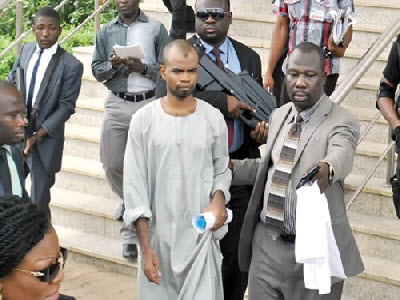The request by the Federal Government to secretly prosecute Kabiru Sokoto, the alleged
mastermind of the December 25, 2011 bombing of St. Theresa’sCatholic Church in Madalla, Niger State was granted yesterday by a Federal High Court in Abuja.
The Federal Government had in an application dated April 24, 2013, asked the court to exclude persons other than the parties, their legal representatives and members of the press from witnessing the trial.
This means that only the accused person, his lawyers, prosecution counsel, and accredited journalists, would be allowed into the courtroom during the proceedings.
Also, the names and addresses of prosecution witnesses would not be disclosed in the course of the proceedings.
This, the prosecuting counsel, Mrs Chioma Onuegbu had argued, was prompted by the need to protect the witnesses.
The defence counsel, Mr. Adamu Ibrahim, did not oppose the application.
The request was granted by the presiding judge, Justice Ademola Adeniyi.
Also on Monday, the court dismissed an application in which Sokoto sought to quash the charges brought against him on the grounds that the court lacked the jurisdiction to try him.
Sokoto’s lawyer, Ibrahim, had in the application dated May 3, 2013, asked for an order of court quashing the charges against the accused person for want of jurisdiction.
The defence counsel argued that Sokoto should be discharged on the grounds that the court lacked the jurisdiction to try the case and that the prosecution did not establish any primafacie evidence against the accused person.
Ibrahim stressed that it was unlawful to try Sokoto in the Abuja Division of the Federal High Court, whereas the alleged offences for which he was charged to court were committed in parts of Sokoto and Niger states.
But the prosecuting counsel insisted that the court had the jurisdiction to hear and determine the case and cited the provisions of section 19 of the FHC Act which empowered the FHC had jurisdiction over the entire country, stating that the various divisions were created for purely administrative purposes.
She added that section 70 of the Criminal Procedure Act also empowered the court to try an accused person in any division where it was most convenient to try him.
Onuegbu maintained that it was more convenient to prosecute Sokoto inAbuja, especially as he was arrested in Abuja, where he was resident, even though he committed the alleged offences in Sokoto and Niger states.
The prosecution counsel equally insisted that a prima facie case had been established against Sokoto.
Ruling on the application, Justice Adeniyi held that the court had thejurisdiction to try Sokoto.
He also upheld the prosecution’s argument that a prima facie case had been established against the accused person.
Justice Adeniyi noted that section 32 of the Terrorism Prevention Act 2013 stipulates that a FHC in any part of the country has the jurisdiction to try any charge emanating from offences committed in any part of the country.
“Accordingly, the court has the jurisdiction to try the accused person,Kabiru Umar, alias Kabiru Sokoto. The prosecution has established a prima facie case against the accusedperson to warrant his trial.
“The motion on notice dated May 3, 2013 is hereby dismissed,” he said.
The defence counsel equally moved an application, asking the court to grant Sokoto bail.
However, the prosecution opposed the application, citing the fact thatSokoto escaped from the custody of the police when police officers went to search his residence in Abaji, a town on the outskirts of the Federal CapitalTerritory.
Justice Adeniyi, who wanted to stand down the matter for some hours in order to deliver his ruling on the bail application later on Monday evening, had to adjourn the case to May 9, 2013, to rule on the motion after defence counsel, Ibrahim, complained of tiredness.
The judge also ordered that the prosecution would call its first witnesses on that day.
Sokoto had during his arraignment on April 19, 2013, denied the two-count charge brought against him by the Federal Government.
Apart from the charge that he had prior knowledge of the St. Theresa’s Catholic Church bombing, Sokoto was also accused of planning to bomb the headquarters of the police force in Sokoto State as well as other government organisations in the state.



Leave a Reply